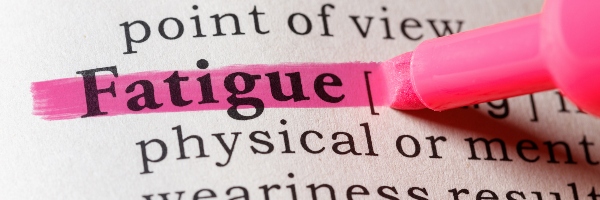What is fatigue?
Fatigue is a term used to describe a constant lack of energy or motivation, and extreme tiredness, as opposed to simply feeling sleepy. Although it’s possible for sleepiness to be a symptom of fatigue, it’s important to note that they’re not the same. Fatigue can manifest itself as both mental, physical, or a combination of both.
What is the difference between fatigue and tiredness?
Experiencing feelings of tiredness at some point in your life – for example, after a long day of work or a hard workout – is normal. However, persistent fatigue that is unusual for you needs attention.
In some instances, fatigue can be a signal from the body that something is wrong, but the causes of fatigue vary. Individuals can become fatigued as a result of various medical or mental health conditions, and there are also a number of lifestyle factors that can contribute to such feelings. The latter could include consuming excessive amounts of alcohol, enduring periods of emotional stress, or a lack of physical activity, to name a few.

If, after making healthy lifestyle changes, fatigue still remains, it’s important that you consult your doctor – who can help with a diagnosis. Experiencing fatigue for long periods of time can be distressing, but there are ways to treat it.
What are the symptoms of fatigue?
Experiencing fatigue can lead to numerous physical and emotional symptoms, which could include:
- Chronic tiredness or sleepiness
- Headaches
- Dizziness
- Muscle weakness and aches
- Slowed reflexes and responses
- Impaired decision-making and judgement abilities
- Irritability
- Impaired hand-to-eye coordination
- Loss of appetite
- Reduced immune system function
- Blurred vision
- Short-term memory issues
- Inability to concentrate and pay attention
- Hallucinations
- Low motivation
It’s important to note that, if you do experience any of the above symptoms, there could be another underlying cause. If you’re ever feeling unwell, it’s important that you consult your doctor as soon as you can to receive a diagnosis and treatment.
What causes fatigue?
Fatigue can occur for a number of reasons, and often, there may not be one direct cause – rather a combination of multiple factors. The most common causes of fatigue are:
- Daily life
- Physical health conditions
- Mental health conditions
Daily life
Your daily life can be a leading cause of fatigue:
- Too much physical exertion
- A lack of exercise
- Not getting enough sleep
- Depression and stress
- Boredom
- Grief – someone going through the early stages of grief may experience tiredness and fatigue
- Taking certain medications, such as antidepressants, or acid blocking drugs (PPIs), which can affect amino acid absorption and lead to energy loss, causing fatigue
- Alcohol consumption – although alcohol has sedative qualities that can make you drowsy, alcohol raises the body’s level of epinephrine, a stress hormone that increases the heart rate and generally stimulates the body, which can result in more awakenings through the night
- Taking illicit drugs, such as cocaine
- Caffeine
- Undernutrition
Mental health conditions
Emotional fatigue – triggered by certain mental health conditions – is the most common cause. The following mental health conditions can leave you feeling tired:
If your mental health is disrupting your life, book a doctor’s appointment as soon as you can. Emotional stresses can cause a wide range of symptoms that can present as physical symptoms, which often need disentangling with medical support. A doctor can provide you with an official diagnosis, and recommend an appropriate treatment.
When should you consult your GP?
Where fatigue persists and/or is accompanied by shortness of breath, heavy alcohol use, a cough, change of weight, unusual bleeding, change of urine or bowel habit, you should consult your GP as soon as you can. This way, you can get the support you need to avoid the possibility of your symptoms worsening, or developing into a more serious problem.

How is chronic fatigue treated?
Chronic fatigue syndrome is a special kind of fatigue that needs to be confirmed by a doctor. It’s a feeling of profound tiredness, sometimes to the extent that people can hardly get out of bed. Even a small amount of exercise or concentration makes people feel worse; it’s clearly similar to long-COVID. The causes remain poorly understood, and there is much controversy over treatment.
Those with chronic fatigue syndrome can be offered cognitive behavioural therapy (CBT), which will help with altering mental processes – in turn, helping to alleviate certain emotional stresses. Although CBT cannot cure the physical symptoms of chronic fatigue syndrome, it can help people cope better with their symptoms.
How can you adapt your lifestyle to reduce fatigue?
If your doctor confirms that your fatigue isn’t caused by an underlying medical condition, there are several small lifestyle changes you can make to help boost your energy levels throughout the day.
This could include:
- Altering your diet to include more nutritious foods
- Drinking enough fluids throughout the day to keep yourself hydrated
- Exercising regularly – without over exerting yourself
- Getting enough sleep
- Avoiding situations that increase stress levels
- Engaging in activities that relax you, such as yoga
- Building a strong support system to talk through any emotional stresses you may have
- Managing alcohol and street drug intake
Take away
It is important to remember that feeling tired from time to time is perfectly normal. However, if fatigue persists and begins to impact your day-to-day life, you should consult your doctor. As there are a number of possible causes of fatigue, they can make more sense of the situation – helping you to receive a diagnosis, along with providing tips on how to lead a healthy life. There are also trained mental health professionals you can consult to receive help on how to handle the emotional aspect of fatigue.
If you’ve noticed that you’re feeling more tired in your day-to-day life, a great self-help technique is our Sense of Wellbeing Check on the Evergreen Life app. This covers a wide range of health-related topics – including questions about mental health and daily habits.
- Aichmüller C, Soyka M. La fatigue en cas de maladies de la dependence [Fatigue in substance abuse disorders]. Rev Med Suisse. 2015 Apr 22;11(471):927-30. French. PMID: 26072600.
- Azzolino D, Arosio B, Marzetti E, Calvani R, Cesari M. Nutritional Status as a Mediator of Fatigue and Its Underlying Mechanisms in Older People. Nutrients. 2020 Feb 10;12(2):444. doi: 10.3390/nu12020444. PMID: 32050677; PMCID: PMC7071235.
- Better Health Channel. (2021). Fatigue. Better Health Channel.
- Bpacnz. (2014). Proton pump inhibitors: When is enough, enough? Bpacnz.
- Cleveland Clinic. (2020). Fatigue. Cleveland Clinic.
- Harvard Health Publishing. Harvard Medical School. (2019). Alcohol and fatigue. Harvard Health Publishing. Harvard Medical School.
- Mayo Clinic. (2019). Antidepressants: Get tips to cope with side effects. Mayo Clinic.
- Mayo Clinic. (2020). Fatigue Causes. Mayo Clinic.
- Medical News Today. (2022). Fatigue: Why am I so tired, and how can I treat it? Medical News Today.
- NHS UK. (2021). Myalgic encephalomyelitis or chronic fatigue syndrome (ME/CFS) – Treatment. NHS UK.
- NHS UK. (2012). Overview – Cognitive behavioural therapy (CBT). NHS UK.
- NHS UK. (2018). Symptoms – Generalised anxiety disorder in adults. NHS UK.
- Pathways Health. (2018). Grief Can Have Very Real Physical Symptoms. Pathways Health.
- Rose DM, Seidler A, Nübling M, Latza U, Brähler E, Klein EM, Wiltink J, Michal M, Nickels S, Wild PS, König J, Claus M, Letzel S, Beutel ME. Associations of fatigue to work-related stress, mental and physical health in an employed community sample. BMC Psychiatry. 2017 May 5;17(1):167. doi: 10.1186/s12888-017-1237-y. PMID: 28476149; PMCID: PMC5420158.
- Snel J, Lorist MM. Effects of caffeine on sleep and cognition. Prog Brain Res. 2011;190:105-17. doi: 10.1016/B978-0-444-53817-8.00006-2. PMID: 21531247.
- Vassend O, Røysamb E, Nielsen CS, Czajkowski NO. Fatigue symptoms in relation to neuroticism, anxiety-depression, and musculoskeletal pain. A longitudinal twin study. PLoS One. 2018 Jun 7;13(6):e0198594. doi: 10.1371/journal.pone.0198594. PMID: 29879175; PMCID: PMC5991664.
- Zisook S, Shear K. Grief and bereavement: what psychiatrists need to know. World Psychiatry. 2009 Jun;8(2):67-74. doi: 10.1002/j.2051-5545.2009.tb00217.x. PMID: 19516922; PMCID: PMC2691160.







